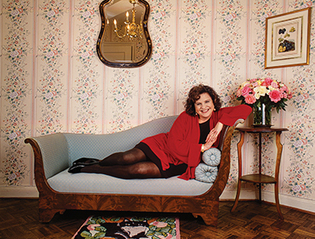
James Hamilton
Wendy Wasserstein
Playwright
By Mark Blankenship ’05MFA
Theater is a stressful business. It demands constant vulnerability, a perpetual stream of creative ideas, and a willingness to watch Juliet stab herself eight times a week. That’s enough to make anyone edgy, and it’s why there are so many projects, from the movie All About Eve to the TV series Smash, that underscore how prickly theater people can be.
That’s also why Wendy Wasserstein ’76MFA (1950–2006) was so remarkable. She was not only one of the most successful playwrights of her generation, but also arguably one of the most beloved people in the American theater. Her legacy is secured as much by the bonhomie she showed her colleagues and fans as it is by her collection of era-defining dramas.
She was hardly a softie, however. Her most celebrated plays pressed on the culture’s sorest spots with a humorous but stubborn insistence that we look closely at what we’re doing to each other. This rankled all kinds of people. Uncommon Women and Others, a play about students at a women’s college, debuted in 1977; it was rebuked by critics for letting female characters speak freely about sex and sexuality. (She began the play as a student at the Yale School of Drama, where she also made lifelong friends, like the playwright Christopher Durang ’74MFA and the designer William Ivey Long ’75MFA.) On the other hand, no less an expert than Betty Friedan dismissed her play The Heidi Chronicles for presenting a female protagonist uncertain how to navigate life in the wake of the women’s movement.
Wasserstein wasn’t the only one wrestling with those issues in the 1970s and 80s.
Her political and emotional complexity—along with her knack for good jokes—helped her connect with a broad audience who wanted to hear what she had to say. Uncommon Women and Others won two Obie Awards and was turned into a TV movie. Her 1993 family drama The Sisters Rosensweig ran for more than 550 performances on Broadway. And The Heidi Chronicles won both the 1989 Pulitzer Prize in Drama and the 1989 Tony Award for Best Play, making her only the second woman to win the latter award and first to win it without a male cowriter.
These blockbuster shows made Wasserstein one of the few living playwrights whose name could sell tickets. But more than that, she became the kind of artist people felt they knew. Her colleagues felt the same way. After she died of lymphoma in 2006, at the age of 55, there were so many people at her memorial service in Lincoln Center that overflow crowds had to watch via video monitors in an alternate location. Even as he grappled with how much of her private life she never let anyone see, Wasserstein’s friend Frank Rich wrote in the New York Times that she was “there for everybody,” with “that uproarious (yet musical) laugh and funny (yet never bitchy) dialogue for every fraught situation.”
 loading
loading